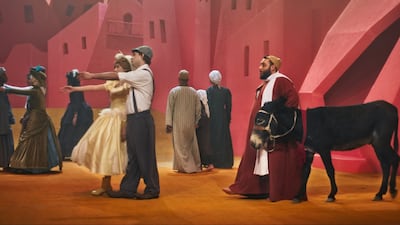Wael Shawky’s video installation Drama 1882 (2024), one of the highlights of this year's Venice Biennale, is going global. After marking its North American premiere at the Toronto International Film Festival on Friday, it is heading to the International Documentary Film Festival in Amsterdam. In November, the piece will be screened at the Public Art Abu Dhabi Biennial.
The 45-minute film was produced for the Venice Biennale's Egyptian pavilion, earning critical acclaim from arts industry publications. Queues reportedly stretched through the Giardini to see Shawky’s reimagining of a 19th-century encounter between the Egyptian nationalist Col Ahmed Urabi and the British imperialists he and others were attempting to depose.
Following its success, Shawky tells The National: "I found it amazing that many nationalities at the biennale found their own stories in modern Egyptian history. Even Koreans who visited the pavilion told me that it reminded them of their Korean/Japanese war."

Shawky, who lives in Alexandria, is known for reaching into history and re-examining accepted narratives, highlighting their biases and omissions. Drama 1882 continues in this vein by looking at the well-known Urabi Revolt from the perspective of the Egyptian people.
It also demonstrates an artistic departure. The artist typically uses distancing elements in this work to signal the fact that the viewer is watching a story, told in one particular way, from history. But for Drama 1882, he worked with real actors (and a real donkey), filming the work in Alexandria’s open-air theatre.
“For all the previous films, I was always trying to escape drama, by using marionettes or kids or masks,” he said at the time. “This time, I felt it was a challenge to connect history to theatre.”

Still, stylisation reigns supreme for the work. The entire story is sung in classical Arabic, which the actors perform theatrically in slow-motion, rocking back and forth to signal a conversation, or very slowly making gestures to express their emotions. The effect is mesmerising. Watching it, one has the feeling of being pulled under and into the story, in which Uraibi faces exploration and treason that he cannot surmount.
The work was Shawky’s first major project for Egypt in recent years and was made with a groundswell of support from the local Alexandrian arts scene. The crew filmed through the Egyptian winter, and in some scenes, one can see the actors’ breath as they braved adverse conditions to pull off the making of the film.


